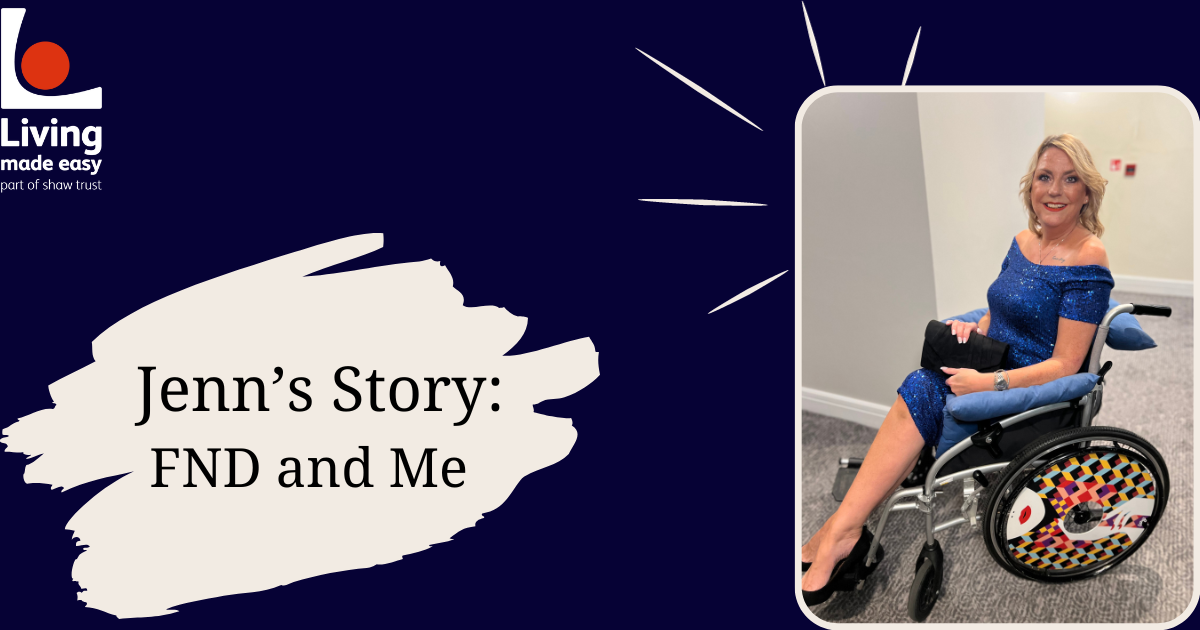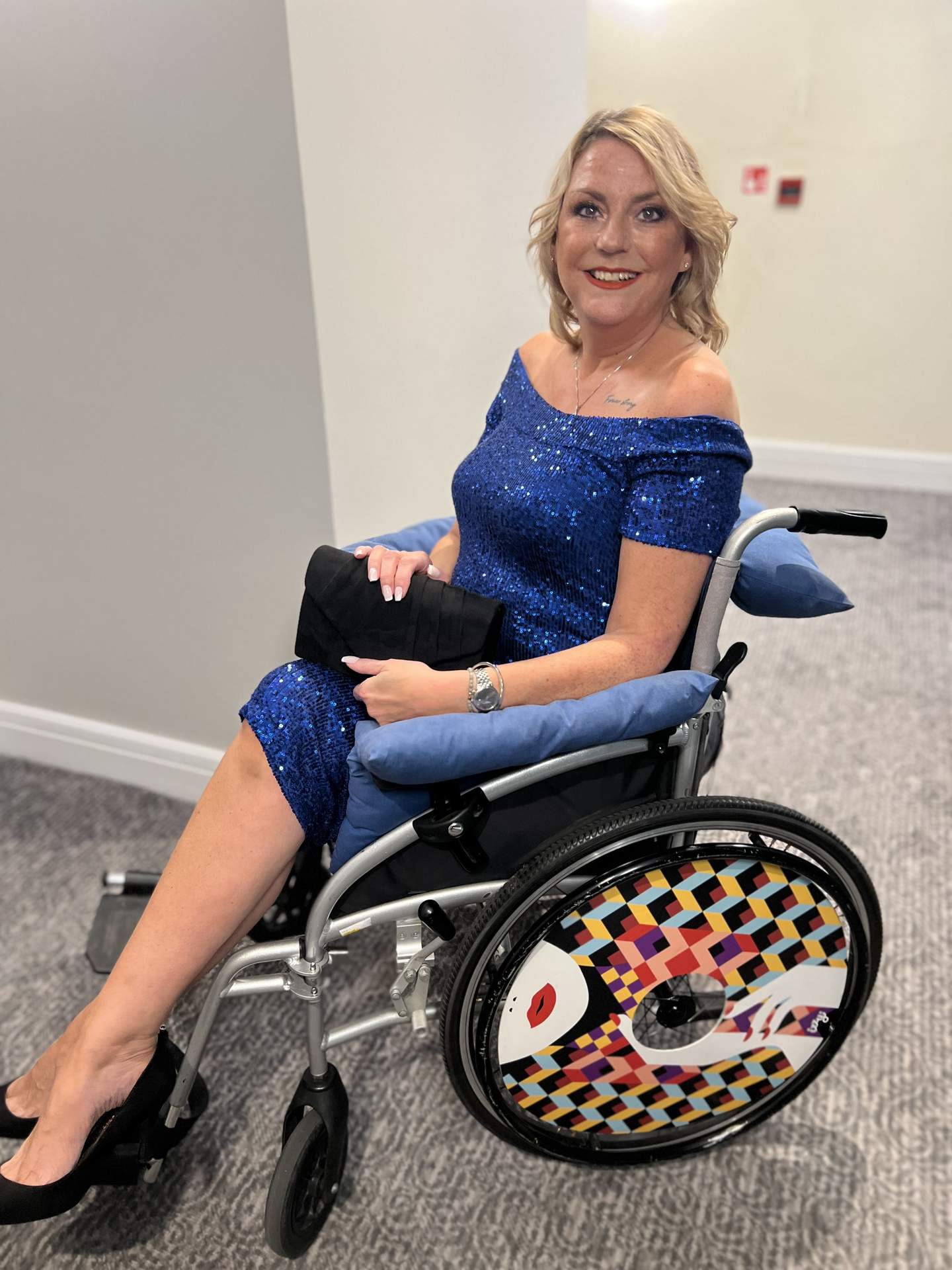
Jenn was 37 years old and living with her husband and son in Australia, when she slipped whilst out shopping and cracked her hip on the floor. She knew immediately she had done some serious damage, and it was confirmed at the hospital that she would need a full hip replacement. It was from here that things took an unexpected turn and eventually Jenn was diagnosed with Functional Neurological Disorder.
Functional Neurological Disorder (FND) happens when there is a problem with the functioning of the nervous system and with how the brain receives and sends information back to the rest of the body. The symptoms of FND are operating in a level of the brain that you can’t control and includes symptoms such as seizures and limb weakness. A diagnosis of FND is reached when a person has one or more clinical features that a specialist can recognise as typical of the disorder and is not due to damage to the brain or nervous system. According to the NHS, clinical features can include:
- Limb Weakness
- Seizures
- Tremors
- Functional dystonia – a type of muscle spasm and causes parts of the body to become stuck in an unusual position.
- Functional gait disorder – problems with walking, sometimes the dragging of one leg, or feeling unsteady when walking.
- Functional drop attacks – suddenly falling to the ground without losing consciousness.
- Sensory symptoms – numbness, pins and needles, or a feeling that a limb isn’t part of your body.
- Cognitive symptoms – problems with memory or concentration.
- Speech and swallowing difficulties
- Persistent postural perceptual dizziness (PPPD) – the dizziness in PPPD is experienced constantly and gets worse when walking or in crowded places.
- Visual symptoms – blurred vision, double vision, sensitivity to light or reduced vision.
- Dissociative symptoms – feeling your body is disconnected from you, that your body doesn’t belong to you, disconnected from the world around you, feeling spaced out, that you are having an out of body experience or that you are floating.
There are other symptoms and conditions that are associated with FND which can include chronic pain, fibromyalgia, persistent fatigue, sleep problems such as insomnia, migraines, panic attacks, anxiety, depression and Post Traumatic Stress Disorder. It’s important to note that FND affects all individuals differently, and so this is not an exhaustive list of what someone might experience.
Jenn’s symptoms first began when she was recovering from her hip replacement, and she started experiencing tremors in her legs and having mobility issues. She decided to see a private back specialist.
‘We didn’t think it could be related to my new hip, as he said I was limping with both legs. As much as I do have some disc problems, he didn’t think that was what was causing my tremors and he suggested I saw a private neurologist as he thought I may have Parkinson’s.
The neurologist did a number of tests and ruled out Parkinson’s and eventually diagnosed me with FND, chronic fatigue, fibromyalgia, chronic pain syndrome and migraines with aura. Shortly after that my dystonia started in my feet, they had twisted inwards, and I was walking on the outside edges of them. Then my face started drooping on the left side and my tongue rolled back. He suggested I saw a private consultant in London who may be able to use Botox to allow my feet and tongue to relax, unfortunately I was told that it was too severe for that treatment.’
By this time Jenn and her family had already moved back to the UK to seek further specialist advice, and hopefully treatment. However, at this time Jenn and her family found that there was very little awareness about the condition. Jenn's neurologist contacted a doctor at a hospital in London on Jenn’s behalf as he was aware they were trialling new treatments.
‘I went to see the doctor and was accepted onto the new programme. I had extensive physio and was finally able to straighten my feet and control my leg tremors. The advice was to stand slowly, shift my weight from leg to leg (which helped control my tremors), and to only walk 50 steps a day. As you can imagine, it was almost impossible to do so few steps every day when I returned home, so my dystonia returned, and it gradually began to affect my whole body. Then, I started having non-epileptic seizures as well.’
With Jenn’s symptoms of FND worsening, she was accepted onto a second round of specialist treatment, but unfortunately the doctors were at a loss, and Jenn was told her symptoms were too severe for them to treat.
Some days, Jenn wakes up and can’t speak at all. Sometimes there is absolutely no warning for when this might happen. The record time she lost her speech for was for 120 days, which was an extremely difficult and frustrating period for her and her family. Jenn now has an app on her iPad which can speak for her in times when she is unable to. Jenn explained her vocal cords are often affected by the dystonia and often she can be mid conversation and her voice will just disappear or turn into what she calls ‘dalek voice’ where her voice sounds robotic. She has also experienced periods where she thinks she is talking normally, but to others her speech sounds as if she is talking in a made-up language.
Jenn now uses a wheelchair when she goes out and says that in the last few years her self-confidence as grown massively, compared to when she first began to use one. She has always loved getting dressed up to go out with her family or friends, and so was thrilled to discover a company which allowed her to dress up her wheelchair too. Izzy Wheels are a company which create designer wheel covers for wheelchairs, which you can easily swap out to create different looks. Jenn has a few of these, including a Christmas themed design, and they are another great way to express yourself.
One of the things Jenn misses most is being able to walk by her husband’s side, and the closeness of this. Until recently, she had missed out on countryside walks as her wheelchair is not built for all-terrain, until she discovered Tramper Hire. The Lake District National Park offer all-terrain mobility scooter (Trampers) hire, free of charge for a day’s use. Jenn says this has been fantastic as it has provided greater access to the countryside and the outdoors, which often is difficult to experience as a wheelchair user.
Jenn was diagnosed with FND in 2015 and apart from various medications to help with pain and to try and control some of her symptoms, she has had no further support with treatment, due to falling into the ‘too hard to treat’ bracket. Something that sadly many people from the disabled community have experienced.
However, Jenn tries her best to keep a positive mindset, which is something that was evident upon meeting with her. Although she is unable to work, she is disciplined on reserving a few hours each morning to complete brain-training and puzzle apps on her Ipad. This is something she says is essential to keeping her mind stimulated and for instilling routine. She also completes a wellness journal each day as an act of self-care, to remind herself of what she can do for herself, even within certain constraints.
A few other things Jenn notes that help her with daily living include a medication reminder, shower stool and a seated wedge cushion. But the biggest help of all comes from her supportive family, who Jenn says she couldn’t manage without.


A picture of Jenn's son Mikey, and her husband, Matt.
We hope you have found this article helpful and informative. For more information on the products mentioned please click on the bold and underlined text or see below.
- Trampers
For more information and support about FND please see below.